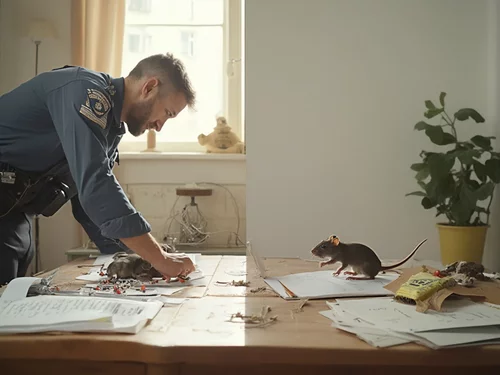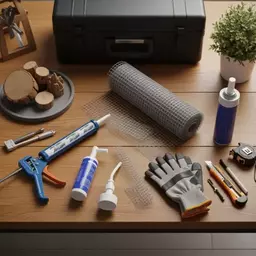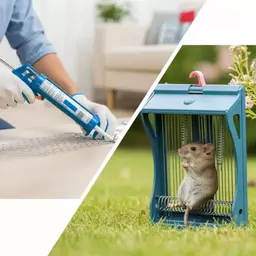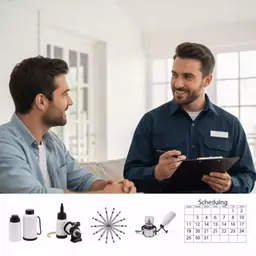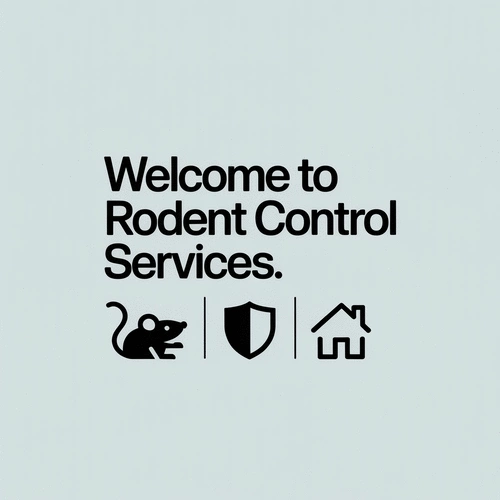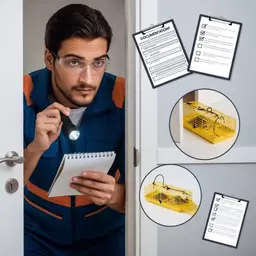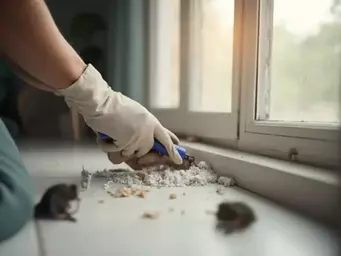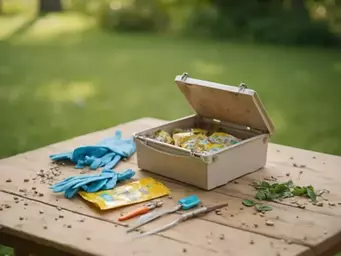As you ponder the choices for rodent control, consider the implications of your decision. Will you trust the expertise of professionals or rely on your DIY skills? Understanding the differences can not only save you time and money but also ensure your space remains rodent-free.
What You Will Learn
- Identify common signs of rodent infestations, including droppings, gnaw marks, and unusual noises.
- Weigh the pros and cons of professional services versus DIY pest control methods.
- Understand the components of Integrated Pest Management (IPM) for sustainable rodent control.
- Assess critical factors like infestation severity, budget, and personal comfort with handling pests before making a decision.
Professional vs. DIY Rodent Control Approaches
Understanding the key differences between professional and DIY rodent control can help you make an informed decision for managing infestations effectively.
Professional Rodent Control
- ✓ Expertise: Trained professionals with specific knowledge and tools.
- ✓ Effectiveness: Comprehensive approach for severe or persistent infestations.
- ✓ Time Saving: Often resolves issues more quickly and efficiently.
- ✓ Safety: Uses methods that minimize risks to occupants and pets.
DIY Rodent Control
- ● Cost-Effective: Lower initial expenses for minor issues.
- ● Control: Direct involvement in the process.
- ● Flexibility: Ability to address problems on your own schedule.
- ● Learning: Opportunity to understand basic pest management.
Factors Influencing Your Decision
For complex situations or safety concerns, professional assistance is generally recommended.
Understanding Rodent Control Options: Professional vs. DIY
When it comes to keeping your space free of rodents, understanding the various control options is crucial. Have you ever faced an unexpected rodent encounter? Whether at home or in the office, the presence of these pests can be unsettling. Knowing whether to choose professional services or tackle the issue yourself can make a significant difference in your approach to pest management.
In this section, we'll dive into the essential aspects of rodent infestations, the implications of your choice between professional and DIY methods, and introduce the concept of Integrated Pest Management (IPM). Let’s get started!
What You Need to Know About Rodent Infestations
Rodent infestations can occur anywhere, and the signs may not always be obvious at first. It’s important to recognize indicators such as droppings, gnaw marks, and nesting materials. Here are some common signs to watch for:
- Visible droppings near food sources or nesting areas
- Gnaw marks on food packaging or furniture
- Unusual noises at night, like scratching or scurrying
- Odors associated with rodent urine and droppings
Being aware of these signs can help you act quickly. The sooner you identify a problem, the easier it is to manage. Remember, a proactive approach can save you time, money, and stress!
Why the Choice Between Professional and DIY Matters
Deciding between professional rodent control and DIY methods often depends on the severity of the infestation and your comfort level with handling pests. DIY solutions can be effective for minor issues, but they may not address larger infestations adequately. On the other hand, professional services provide a comprehensive approach, ensuring that you tackle the problem at its roots.
- Cost-effectiveness: DIY might save money initially, but professional treatments can prevent larger costs down the line.
- Time investment: DIY can be time-consuming; professionals can often resolve infestations more quickly.
- Expertise: Professionals have the training and experience to identify and treat infestations effectively. For instance, a study on rodent control strategies highlights the effectiveness of professional, integrated approaches.
Ultimately, understanding these factors is key to making an an informed decision that aligns with your specific situation.
Exploring Integrated Pest Management (IPM) for Rodent Control
Integrated Pest Management (IPM) is a holistic approach that combines various strategies for effective rodent control. It prioritizes long-term prevention and minimizes risks to human health and the environment. Here are the main components of IPM:
- Inspection: Regularly check for signs of rodent activity and potential entry points.
- Prevention: Seal off entry points and eliminate food sources to deter rodents. This includes understanding the proper use of rodenticides when necessary, as outlined by the USDA.
- Monitoring: Use traps and checks to keep tabs on rodent populations.
- Control: Implement appropriate control measures, whether professional or DIY. It's also important to consider the animal welfare impacts of various control methods.
By utilizing IPM, you not only address existing infestations but also create a sustainable plan for the future. This method reflects our mission at Rodent Control Services to foster rodent-free environments effectively and responsibly. Let’s make your space safe and welcoming again!
Frequently Asked Questions (FAQs)
- Q: What are the primary signs of a rodent infestation?
- A: Common signs include visible droppings, gnaw marks on food packaging or furniture, unusual scratching or scurrying noises at night, and distinct odors from rodent urine and droppings.
- Q: When should I choose professional rodent control over DIY methods?
- A: Professional services are generally recommended for severe or persistent infestations, complex situations, or when safety concerns are high. DIY methods are more suitable for minor issues.
- Q: What is Integrated Pest Management (IPM)?
- A: IPM is a holistic approach to pest control that combines inspection, prevention (e.g., sealing entry points, eliminating food sources), monitoring (e.g., traps), and appropriate control measures to achieve long-term, sustainable rodent control while minimizing risks.
- Q: Can DIY rodent control be cost-effective?
- A: DIY methods can have lower initial costs for minor issues. However, if not handled effectively, they can lead to recurring problems and potentially larger costs in the long run compared to a comprehensive professional treatment.
- Q: What factors should I consider when deciding on a rodent control method?
- A: Key factors include the severity of the infestation, your budget, time constraints, your comfort level with handling pests, the type of rodent, and the specific environment (residential, commercial, agricultural).
Pro Tip
When considering rodent control methods, always start with a thorough inspection of your space. Identifying entry points and signs of infestation early can significantly improve the success of your chosen approach—whether DIY or professional. Remember, prevention is key!
Making the Right Choice for Rodent Control
Choosing the best rodent control method can feel overwhelming. Do you tackle the problem yourself or call in the professionals? At Rodent Control Services, I always encourage my clients to weigh their options carefully, considering their unique circumstances. Understanding the pros and cons of DIY versus professional services is essential in making a decision that best suits your needs.
Before diving into the specifics, let’s examine a few key factors to consider:
- Your level of comfort and experience with pest control methods
- The severity of the rodent infestation
- Your budget and available resources
- Time constraints for addressing the issue
By evaluating these factors, you’ll have a clearer picture of which approach aligns with your situation. Remember, even if you start with a DIY approach, it’s always wise to consult professionals if the situation escalates.
Weighing Your Options: DIY vs. Professional
When it comes to rodent control, the approach can significantly impact the outcome. DIY methods often appeal due to their lower upfront costs and the satisfaction of handling things yourself. However, there are times when professional help is the best route to take. Consider the following:
- DIY: More suitable for minor infestations where you can easily identify entry points and seal them.
- Professional: Ideal for severe infestations where expert knowledge and equipment are required.
In my experience, starting with a professional consultation can set the right tone for your rodent management strategy. They’ll assess the situation and provide tailored recommendations that can save you time and money in the long run!
Factors to Consider Based on Your Unique Situation
Every rodent problem is unique, and several factors can influence your decision. I recommend considering:
- The type of rodent invading your space
- The layout of your home or business
- Your tolerance for chemicals and potential health risks
- Local regulations regarding pest control methods
By reflecting on these elements, you can make a well-informed choice that prioritizes your safety and effectiveness. Remember, it’s about finding the balance that works for you!
Pest Management Strategies for Different Environments
Understanding your environment is crucial in determining the best pest management strategy. Different settings call for tailored approaches. For example:
- In residential areas, focusing on exclusion techniques like sealing cracks and using traps is often effective.
- For commercial spaces, implementing an Integrated Pest Management (IPM) approach can be beneficial, as it combines prevention, monitoring, and control strategies.
- In agricultural settings, a more comprehensive strategy involving biological control methods may be required to manage rodent populations sustainably.
Ultimately, the best rodent control solution is one that considers the specific needs of your environment. At Rodent Control Services, we pride ourselves on helping you identify the most effective strategy tailored to your circumstances!
Recap of Key Points
Here is a quick recap of the important points discussed in the article:
- Recognize signs of rodent infestations, such as droppings, gnaw marks, and unusual noises.
- Evaluate the severity of the infestation to choose between DIY methods and professional services.
- Consider Integrated Pest Management (IPM) strategies for effective long-term rodent control.
- Weigh factors such as budget, time, and comfort level when deciding on pest management approaches.
- Tailor your rodent control strategy to your specific environment, whether residential or commercial.

